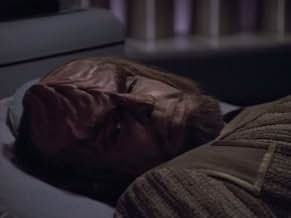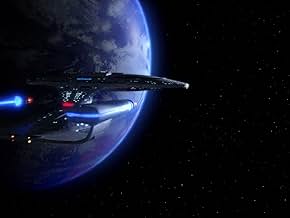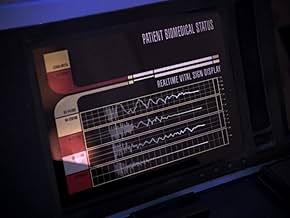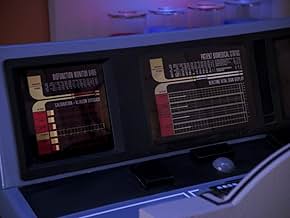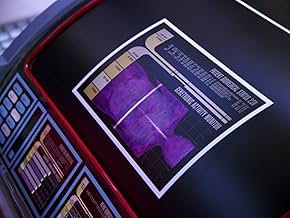Ethics
- Episode aired Feb 29, 1992
- TV-PG
- 46m
IMDb RATING
7.2/10
3.5K
YOUR RATING
After an accident that leaves him no longer able to walk, Worf asks Riker to help him commit suicide.After an accident that leaves him no longer able to walk, Worf asks Riker to help him commit suicide.After an accident that leaves him no longer able to walk, Worf asks Riker to help him commit suicide.
David Keith Anderson
- Ensign Armstrong
- (uncredited)
Rachen Assapiomonwait
- Crewman Nelson
- (uncredited)
Lena Banks
- Starfleet Ensign
- (uncredited)
Michael Braveheart
- Crewman Martinez
- (uncredited)
Debbie David
- Ensign Russell
- (uncredited)
Denise Deuschle
- Science Division Officer
- (uncredited)
Margaret Rose Flores
- Starfleet Sciences Officer
- (uncredited)
Grace Harrell
- Operations Division Officer
- (uncredited)
7.23.4K
1
2
3
4
5
6
7
8
9
10
Featured reviews
Klingon values
In the original Star Trek series the Klingons were presented as a just a simple race who just liked to fight. But with TNG and the addition of Michael Dorn as Worf, a crewman on the Enterprise we got a far fuller picture of Klingon values.
Dorn is injured and he is looking at a possible life of paralysis. Dr. Crusher says in time he can regain 60% of his mobility. But that's not good enough, a Klingon is whole or he's nothing in his culture.
Time for a consultant and a futuristic neurologist in Caroline Kava is called in. Gates McFadden and her have some professional and personal differences that are part of the story.
The rest is Worf trying to decide what to do and not having other Klingons around he's not given much support.
These are the moments that counselor Troi is called in. Every time I watch Marina Sirtis I wish our school guidance counselors were like her.
Dorn is injured and he is looking at a possible life of paralysis. Dr. Crusher says in time he can regain 60% of his mobility. But that's not good enough, a Klingon is whole or he's nothing in his culture.
Time for a consultant and a futuristic neurologist in Caroline Kava is called in. Gates McFadden and her have some professional and personal differences that are part of the story.
The rest is Worf trying to decide what to do and not having other Klingons around he's not given much support.
These are the moments that counselor Troi is called in. Every time I watch Marina Sirtis I wish our school guidance counselors were like her.
Classic Star Trek Morality Play
I won't rehash the synopsis since that's been well handled already.
But did Starfleet cancel the industrial safety training course at the Academy? How could those barrels be stacked on the second level of the storage rack, and not even be secured? That ship is always bouncing all over the place. Someone needs to get fired.
But did Starfleet cancel the industrial safety training course at the Academy? How could those barrels be stacked on the second level of the storage rack, and not even be secured? That ship is always bouncing all over the place. Someone needs to get fired.
A great episode, to skip.
The Crusher family is annoying. The visiting doctor is a gross jerk. Ok so a lot of stuff here.
Worf is hurt, can't walk. Wants to die with honor. Abandon his kid for honor? Then his dumb kid is there saying "yes sir" all the time. Blah blah. But here is my big problem, they go ahead with a life threatening and risky surgery. The doctors and the nurse is all wrapped up and sterilized. Yet Worf is laying on the table with his hair just flopped out right where they are making an incision. Hmm... that's just sloppy and unacceptable.
Why did this happen? They can warp across the galaxy, transporters can phase people up and down to and from planets. But there are no nanites or cloned organs?
Meh ok I'm gonna shut up. I just found this Crusher heavy episode to be annoying.
Worf is hurt, can't walk. Wants to die with honor. Abandon his kid for honor? Then his dumb kid is there saying "yes sir" all the time. Blah blah. But here is my big problem, they go ahead with a life threatening and risky surgery. The doctors and the nurse is all wrapped up and sterilized. Yet Worf is laying on the table with his hair just flopped out right where they are making an incision. Hmm... that's just sloppy and unacceptable.
Why did this happen? They can warp across the galaxy, transporters can phase people up and down to and from planets. But there are no nanites or cloned organs?
Meh ok I'm gonna shut up. I just found this Crusher heavy episode to be annoying.
Platitudes
Maybe one of the worst episodes. The writers couldn't decide whether the story should be about the right to choose one's death or experimental medicine and taking risks to preserve life. In typical poorly conceived fashion, the writers chose to push both agendas, then punish the researcher who made life possible. Another bad episode straight of the the worst Hollywood hack's Powerbook.
That's a very human perspective, Will
Worf has an accident that leads to paralysis and Dr Crusher faces an ethical dilemma.
This is an interesting but slightly melodramatic episode that lives up to its title.
The plot is a very straightforward medical drama that addresses a number of points such as experimental treatment, and assisted suicide. It also attempts to create moments of suspense, but this largely fails due to the level of the stakes involved.
When it addresses the issues at the heart of the story it is at its most effective. The conflict between Dr Crusher and Dr Russell is the strongest point for me. Gates McFadden gives one of her best performances with a very intriguing subject.
The parallel conflict between Worf and Riker is also pretty good, but a lot more aggressively stated. Jonathan Frakes puts his heart into the argument, but the writing associated with Riker's stance on the subject is a bit preachy at times.
Michael Dorn does a great job portraying Worf as you would expect the character to react in this circumstance. His interactions with everyone are excellent. He is such a cool character.
As ever Captain Picard puts his ultimate philosophical stamp on both arguments and Patrick Stewart does it with his usual level of class.
It ends with an attempt at creating suspense that is fairly well made, but falls flat because we obviously know what the outcome will be and even how we might get there due to a hint given earlier.
This is an interesting but slightly melodramatic episode that lives up to its title.
The plot is a very straightforward medical drama that addresses a number of points such as experimental treatment, and assisted suicide. It also attempts to create moments of suspense, but this largely fails due to the level of the stakes involved.
When it addresses the issues at the heart of the story it is at its most effective. The conflict between Dr Crusher and Dr Russell is the strongest point for me. Gates McFadden gives one of her best performances with a very intriguing subject.
The parallel conflict between Worf and Riker is also pretty good, but a lot more aggressively stated. Jonathan Frakes puts his heart into the argument, but the writing associated with Riker's stance on the subject is a bit preachy at times.
Michael Dorn does a great job portraying Worf as you would expect the character to react in this circumstance. His interactions with everyone are excellent. He is such a cool character.
As ever Captain Picard puts his ultimate philosophical stamp on both arguments and Patrick Stewart does it with his usual level of class.
It ends with an attempt at creating suspense that is fairly well made, but falls flat because we obviously know what the outcome will be and even how we might get there due to a hint given earlier.
Did you know
- TriviaDr. Russell makes reference to a paper Dr. Crusher has written regarding cybernetic regeneration. Crusher had previously mentioned developing a workable approach on this in 11001001 (1988).
- GoofsThe heavy barrel that falls on Worf in the cargo bay was being stored high up and was not strapped down/secured in any way. On a starship that is often subjected to sudden, violent jars and jolts (so much so that bridge crewmen are often thrown from their seats), heavy, dangerous cargo would not be stacked/stored without being properly secured in some way.
- Quotes
Alexander Rozhenko: This is part of that Klingon stuff, isn't it? My mother always said Klingons had a lot of dumb ideas about honor.
- ConnectionsReferenced in Star Trek: The Next Generation: Parallels (1993)
- SoundtracksStar Trek: The Next Generation Main Title
Composed by Jerry Goldsmith and Alexander Courage
Details
- Release date
- Country of origin
- Official site
- Languages
- Filming locations
- Production company
- See more company credits at IMDbPro
- Runtime
- 46m
- Color
- Sound mix
- Aspect ratio
- 1.33 : 1
Contribute to this page
Suggest an edit or add missing content

